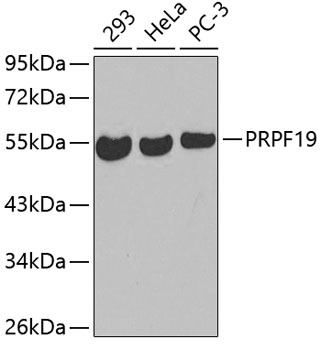-
Product Name
PRPF19 Polyclonal Antibody
- Documents
-
Description
Polyclonal antibody to PRPF19
-
Tested applications
WB, IHC, FC
-
Species reactivity
Human, Mouse
-
Alternative names
PRPF19 antibody; NMP200 antibody; PRP19 antibody; PSO4 antibody; SNEV antibody; UBOX4 antibody; hPSO4 antibody; pre-mRNA-processing factor 19 antibody
-
Isotype
Rabbit IgG
-
Preparation
Antigen: A synthetic peptide of human PRPF19
-
Clonality
Polyclonal
-
Formulation
PBS with 0.02% sodium azide, pH7.3.
-
Storage instructions
Store at 4℃. Avoid freeze / thaw cycles.
-
Applications
WB 1:1000 - 1:2000
IHC 1:50 - 1:200
FC 1:20 - 1:50 -
Validations

Western blot - PRPF19 Polyclonal Antibody
Western blot analysis of extracts of various cell lines, using PRPF19 antibody .Secondary antibody: HRP Goat Anti-Rabbit IgG (H+L) at 1:10000 dilution.Lysates/proteins: 25ug per lane.Blocking buffer: 3% nonfat dry milk in TBST.
-
Background
Ubiquitin-protein ligase which is a core component of several complexes mainly involved pre-mRNA splicing and DNA repair. Core component of the PRP19C/Prp19 complex/NTC/Nineteen complex which is part of the spliceosome and participates in its assembly, its remodeling and is required for its activity. During assembly of the spliceosome, mediates 'Lys-63'-linked polyubiquitination of the U4 spliceosomal protein PRPF3. Ubiquitination of PRPF3 allows its recognition by the U5 component PRPF8 and stabilizes the U4/U5/U6 tri-snRNP spliceosomal complex. Recruited to RNA polymerase II C-terminal domain (CTD) and the pre-mRNA, it may also couple the transcriptional and spliceosomal machineries. The XAB2 complex, which contains PRPF19, is also involved in pre-mRNA splicing, transcription and transcription-coupled repair. Beside its role in pre-mRNA splicing PRPF19, as part of the PRP19-CDC5L complex, plays a role in the DNA damage response/DDR. It is recruited to the sites of DNA damage by the RPA complex where PRPF19 directly ubiquitinates RPA1 and RPA2. 'Lys-63'-linked polyubiquitination of the RPA complex allows the recruitment of the ATR-ATRIP complex and the activation of ATR, a master regulator of the DNA damage response. May also play a role in DNA double-strand break (DSB) repair by recruiting the repair factor SETMAR to altered DNA. As part of the PSO4 complex may also be involved in the DNA interstrand cross-links/ICLs repair process. In addition, may also mediate 'Lys-48'-linked polyubiquitination of substrates and play a role in proteasomal degradation. May play a role in the biogenesis of lipid droplets (By similarity). May play a role in neural differentiation possibly through its function as part of the spliceosome (By similarity).
Related Products / Services
Please note: All products are "FOR RESEARCH USE ONLY AND ARE NOT INTENDED FOR DIAGNOSTIC OR THERAPEUTIC USE"
